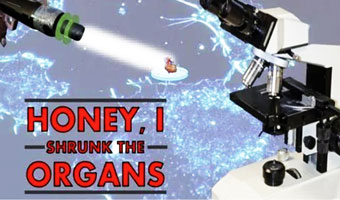Understanding what part inherited traits play in an individual’s chance of developing breast cancer; analyzing the specific biology of each tumor to better tailor therapy for each patient; and diagnosing cancer through blood samples, rather than performing biopsies, are the goals that are shaping the approach the Hadassah Medical Organization is taking to cancer research and treatment.
One current study, involving 130 breast cancer patients, is aimed at identifying founder mutations in various ethnic groups which put people at higher risk for breast cancer. These founder mutations are found in high frequency within a specific population---all with a common ancestor. While Hadassah research confirmed many years ago that there is at least a 10 times greater prevalence of BRCA1 gene mutations among women of Ashkenazi descent, more recently Hadassah identified a founder mutation in Sephardic Jews and then in Kurdish Jews. This latest finding is highlighted in Open Medicine Journal, 2015, 2: 31-36.
In another study, Hadassah’s oncology team is collaborating with members of the pathology department as well as Prof. Yuval Dor of the Hebrew University to detect breast cancer in a person’s circulating tumor DNA (ctDNA). This DNA, which is derived from the tumor, floats in the blood and thus becomes a specific marker that can be detected, measured, and tracked. In addition, it is tissue/organ specific so researchers would know which type of cancer is present.
As Senior Oncologist Dr. Aviad Zick relates: “Treatment of early breast cancer leads to a cure in more than 90% of patients.” But, he explains, “because patients are treated with chemotherapy based on statistical models, rather than their individual tumor’s molecular makeup, some women don't benefit from standard chemotherapy.” Therefore, he says, “a reliable predictive biomarker for chemotherapy is urgently needed.”
It is important to note, however, that chemotherapy is not always the right choice of treatment. As Prof. Tamar Peretz, head of Hadassah’s Sharett Institute of Oncology and Director of its Center for Malignant Breast Diseases, explains: “Many women that are diagnosed at a very early stage with nonaggressive tumors are not given chemotherapy. Rather, chemotherapy is indicated for those with a worse prognosis, and the chemotherapy does improve their prognosis. Today we have more accurate tools, based on molecular evaluation, that predict who may benefit and thus this reduces the number of women who get chemotherapy without any benefit.”
At the same time, Dr. Zick relates: “We hypothesize that ctDNA can serve as a predictive biomarker for chemotherapy success in early breast cancer.” The research plan is to test the ctDNA of breast cancer patients and patients who have cancer in other organs to see what mutations and markers they have in their blood. Then they will compare these samples to the plasma ctDNA of healthy individuals.
Prof. Peretz explains: “The research assumption is that if there are tumor cells in the blood, the patient would eventually develop metastases. We expect that giving chemotherapy or other treatments will eliminate the potential development of metastases. In some patients, we will see disappearance of the tumor in the circulating DNA; those are the patients that should continue with the chemotherapy. In those patients where we don’t see a reduction of the tumor in the circulating DNA, we know that the selected treatment was not effective and another therapy needs to be tried.”
Another avenue of study at Hadassah is examining a specific DNA change that leads to breast cancer. Called ERBB2 DNA amplification, this phenomenon involves overexpression of a gene and is a characteristic of aggressive breast tumors. ERBB2 amplification serves as a predictive marker for whether treatment with HER2 inhibitors will prolong the survival of a breast cancer patient. Although this treatment is the standard of care, explains Dr. Zick, “only a minority of HER2 positive cancer patients (those with this specific protein) benefit from this treatment.”
To further understand this particular gene overexpression, Hadassah’s researchers established a Whole Genome Sequencing (WGS) platform that allows them to study tumor amplification in great detail. Using WGS, they examined a few patients with exceptional response to HER2 inhibitors. “Our findings suggest that the structure of the ERBB2 amplicon (the amplified segment) is related to the exceptional response to treatment,” Dr. Zick notes. Consequently, they plan to examine all ERBB2 amplified tumors they can find in public databases. In addition, they will sequence 30 ERBB2 amplified breast tumors for their characteristics and see if they can establish sub-groups based on these characteristics and then tailor treatment accordingly.
As Dr. Zick notes, the goal at Hadassah is to more precisely identify people at risk for breast cancer, monitor how the breast cancer is reacting to treatment using these new Hadassah-developed markers, and identify those patients who will truly benefit from a particular therapy.









